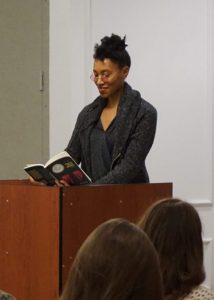
Venita Blackburn: Writing the Story that Scares You
November 27, 2018 | blog, news, readings

By Grace Timko (Fiction ’20) and Rosie Mary Jane Kopman (Fiction ’20)
On Thursday, November 15th, Venita Blackburn read from her newly published short story collection, Black Jesus and Other Superheroes, for the last of the 2018 Crazyhorse readings. First year fiction student in the College of Charleston MFA program, Rosie Mary Jane Kopman, introduced Blackburn by speaking to her own experiences reading the visiting writer’s work: “As a reader, I felt like I was water, Blackburn a sponge. I passed through the story, quick as water runs, but she caught me in the stream, soaked up as much of me as possible, and rung me out, still the same substance, but changed.”
Venita Blackburn has recently taken up a Creative Writing teaching position at California State University, Fresno. In 2017 she won the Prairie Schooner Book Prize for fiction, which resulted in the publication of her collected stories, Black Jesus and Other Superheroes. Her work has appeared in the Paris Review, The Los Angeles Review of Books, Print Quarterly Journal, American Short Fiction, The Georgia Review, among many others.
When reading aloud, Blackburn’s own voice gave new life to her characters, new depth to her stories. “Chew,” based off the true story of a young boy who chewed a Pop-Tart into the shape of a gun at school, explores themes of masculinity, “in an era of men behaving badly,” as well as the juxtaposition between adult tools and childhood. In “Chew,” the male narrator, father of a young boy who chews a plastic coin into a shape similar to a bullet, proclaims that, “We chew in our family. It is our god-given freedom to chew what and when we want,” an exploration which directly mirrors the very real arguments for the possession of firearms. As the father recalls his fight to prevent his son’s suspension, he accusingly speaks of others involved, including, “the crooked eared girl,” whom his son threw the bullet shaped object toward while yelling, “Bang. Bang.”
Blackburn also read a short piece, “Fam,” recently published in the Paris Review. “Fam” has a collective narrator, an element of the piece that is instantly known as they introduce their “lil sister/niece/granddaughter/baby cousin.” The piece addresses issues that plague young women specifically, such as appearance and popularity in a world driven by social media. Blackburn seamlessly weaves through the past, revealing different facets of the young woman through the collective voice. However, the absence of the young woman’s mother is at the heart of the narrative, culminating in the line: “When your mother punches you in the chest for reasons too small to see, the rest of the world has a hard time hurting you more.”
Following the reading, Blackburn answered questions about her work and process. While it is clear that she is drawn to flash and shorter forms of fiction, many were interested in how she achieves so much in a piece that might span only a few pages. When asked about her privilege of language over anything else when writing, she responded by saying, “I have to hear something interesting in the sentences before I commit…. Once sounds stay with me, I’ll commit it to something, and usually before I even start writing the story, I’ve already seen it in two parts of it that somehow need to come together.”
Blackburn also advised aspiring writers to write the stories “you are almost ashamed to share.” She continued by presenting a particularly demanding—yet rewarding—task for writers: “You have to go to the places that are not easy…. Go there first and then try to see how you can shape it, structure, apply all of the devices that we know. The story itself has to start with just who you are. It can be almost dangerous and those are the ones we want. That’s what the world needs.”
Unflinching and with an air of calm and subtle humor, Blackburn shared her world and the worlds of her stories. Of her first collection, she said, “I remember this feeling of putting it in the envelope when I mailed it off, that I liked it, and it went off and sang.” Now, with her book in the world, it can be said that many are eager to hear her writing sing.



